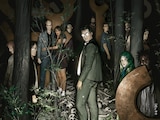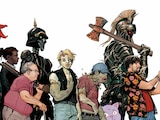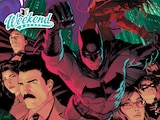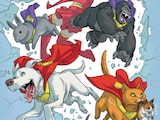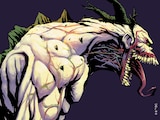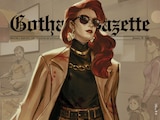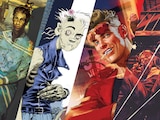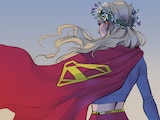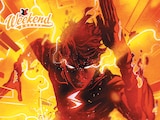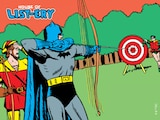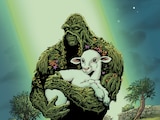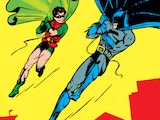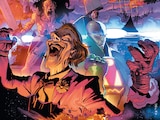You're going to see a disclaimer at the bottom of this article that the opinions stated here are solely my own, and do not necessarily represent those of Warner Bros. and its subsidiaries, but believe me anyway when I say this: Cassandra Cain is the greatest hero in the history of DC Comics. The definition of a hero is someone who uses everything they have to rise up, inspire and protect those around them. As a girl trained from her birth to be the ultimate assassin, nobody had higher to rise than Cass. Denied language, identity or even a name, Cassandra got to define herself by escaping the life she was made to lead and becoming the person of her own choosing. One who uses all the skills she was given to make sure that no one has to die again.

Those who know Cassandra, love Cassandra. She was the first Batgirl to have her own comic series, which ran for nearly 75 issues. She won multiple “Best Heroine” awards in major publications years in a row for that entire run. But after a certain point, Cassandra started going through radical changes. Lapses into supervillainy. Under mind control. Shipped away to Hong Kong. Erased from continuity entirely, only to creep back in without the bat symbol which once meant so much to her.
In her cinematic debut, Birds of Prey (And the Fantabulous Emancipation of One Harley Quinn), everything about her character other than her name and ethnicity was changed in translation. It almost seems as if, for a time, and despite her massive popularity in the early 2000s, that people were afraid to write Cassandra as she was.
Today, a very true-to-heart Cassandra shares the Batgirls spotlight with her chosen family of Barbara Gordon and Stephanie Brown. But for over a decade, this once-celebrated Batgirl was difficult to find anywhere. So, this AAPI Heritage month, a year after Cassandra graced the cover of the Asian superhero anthology, DC Festival of Heroes, it’s appropriate to take a look inward and ask ourselves: what’s the problem with Cassandra Cain?

Cassandra was trained by her father, the assassin David Cain, to dedicate her entire being to the art of fighting. She was denied even the chance to learn language, with the theory that the language of violence would be the only one she would ever know. This built Cassandra’s reputation in her first few appearances as an imposing figure who could take on anyone in any room, but was nearly incapable of greeting those same people.
For Asian readers, this was a situation which was all too familiar. It wasn’t the first time you saw such a character in fiction and media. Or the tenth. Or the hundredth. Or the thousandth.
The idea of the “mysterious, incomprehensible Asian” is a stereotype as old as European traders’ first encounters with East Asian society, who treated the language and cultural barriers between their people as if they were a separate class of human being. In time, the ideas spread among Western cultures that Asians could be wise and stoic, but “they were not like us.”
In the centuries since, these ideas have crept into our media, often treating Asian women as symbols of horror or sexuality, but rarely as an individual. From Miss Saigon and Full Metal Jacket to Kill Bill, Western media has often exhibited a serious problem in depicting Asian women as set dressing and sacrificial dolls with little way to express themselves. With all of this cultural baggage, the idea that we would introduce our first major Asian hero in Gotham City as a young woman literally without the ability to verbally express herself is not just shocking, but reprehensible.

And it would be, if that was where Cassandra’s story ended. Everyone who’s ever wanted to delete this Batgirl from the canon, or significantly change her, would be correct. But this denial of communication is not where Cassandra’s story ends. In fact, it’s only chapter one. Because what makes Cassandra the best hero in the history of DC Comics is that she has never once been a static character. Through the story of her first solo title, and in the twenty years since, Cassandra Cain is that rarest of characters in superhero media: a hero who is allowed to change, and allowed to grow.
When we first meet Cassandra in “Batman: No Man’s Land,” we see a motherly Barbara Gordon working diligently with her new ward to help her learn language. Together, they achieve a breakthrough as words start slowly coming to her. But in the fifth issue of Batgirl, something unexpected happens: Cassandra encounters a telepath, who accidentally unscrambles her mind so that she can think in full sentences for the first time. Language becomes something she can comprehend, although it comes with the unlearning of her unrivaled fighting abilities, which she only regains through the conditional tutelage of Lady Shiva. Become the best once again, and fight Shiva to the death in one year, or remain simply adequate for the rest of her life. For Cassandra, it was no choice at all.

Years later, we’d learn this wasn’t just a narrative device to define Cassandra’s values. Editor Joseph P. Illidge recently wrote about how even at the time, concerns about how Cassandra’s fierce and silent background drew parallels to a deeply rooted stereotype were raised—a fact which had been so ingrained in our culture that the creators had not even recognized it until it was pointed out. It was then that the psychic detangling was plotted to advance her character a bit more rapidly, but the intent was always the same: Cassandra Cain, like the role of the Asian woman in media itself, was built to adhere to one specific ideal, as a tool in her father’s story. From the very beginning, Cassandra’s strength came from refusing to be that tool.
Cassandra Cain’s narrative arc is literally about a woman denied a voice finding the ability to speak—to discover love from friends and chosen family, a passion for stories and literature and most of all, a symbol of heroism to live up to. Because more than anyone since Bruce himself, Cassandra Cain understands the drive to rise from your own darkness and be the hero you wish existed when you were helpless. The Asian stereotype of the silent other will always be a part of Cassandra’s story, because that very symbol has become the thing which Cassandra exists to outgrow.

AAPI Heritage Month itself is about showing how this community of many cultures can recognize and celebrate a shared experience, but cannot be defined by the boxes through which popular media and othering conceptions confine them. Denial and erasure of this troubling history would be a disservice to the obstacles which Asian Americans have had to overcome and over which there remains a lot of progress to make. But whether it’s Barbara, Cassandra or Stephanie, the mantle of Batgirl has always meant one thing above anything else: no one but you gets to tell you who you get to be.
Alex Jaffe is the author of our monthly "Ask the Question" column and writes about TV, movies, comics and superhero history for DCComics.com. Follow him on Twitter at @AlexJaffe and find him in the DC Community as HubCityQuestion.
NOTE: The views and opinions expressed in this feature are solely those of Alex Jaffe and do not necessarily reflect those of DC Entertainment or Warner Bros.

